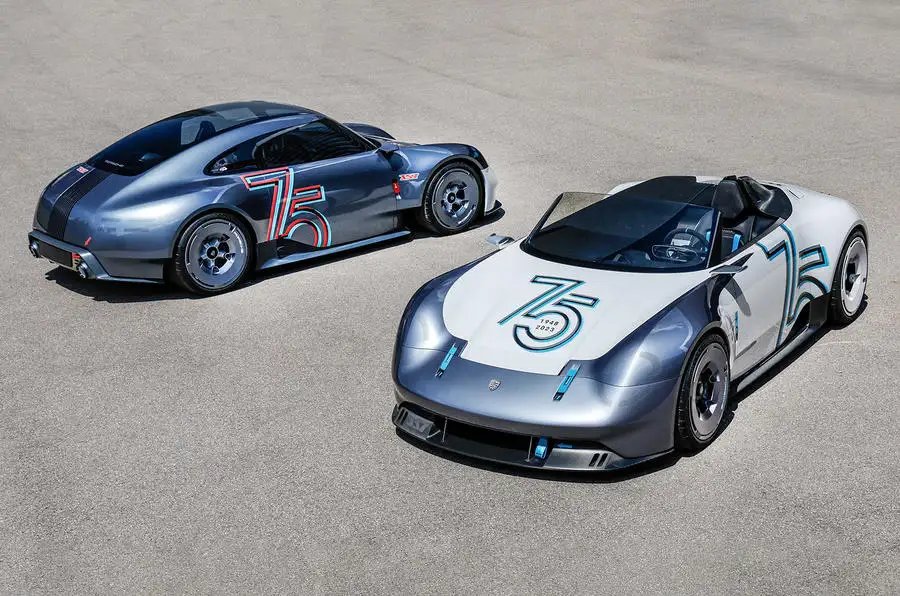Porsche has previewed a radical change of direction for its dedicated sports cars in the electric era, with the recently revealed Mission X and Vision 357 concepts giving clues as to what to expect.
Head of advanced exterior design Ingo Scheinhütte said the styling of upcoming Porsche sports cars “must be an evolution” that respects the German firm’s heritage, as evidenced by the radically different concepts, which will also have an influence on upcoming saloons and SUVs.
Autocar recently spoke to Scheinhütte to discover how Porsche’s latest concepts could shape its future electric production cars.
Which elements of the Mission X electric hypercar and 356-inspired Vision 357 concepts will we see on production cars?
“You bring all the ideas to a concept, but you have to see how they develop. Some elements are essential for our brand ID, like the continuous light arch – and on the Mission X, you see a development of that. Instead of just having a light bar, it now has the Porsche logo integrated into it. I’m confident this is something we will see in production.
“The two concepts are very different in the way they are designed. The 357 is a love letter to the original Porsche shape, while the Mission X is a development of the Porsche design language.”
Can this design approach work in other segments?
“The more you go into the limousine segment and SUV segment, the less 3D shapes you can play with, so [sports] cars are kind of our blueprint that we try to take and adapt to our SUVs.
“Some things work, some things don’t. On the 357, there is a crease on the side, and usually Porsches are very round. This time, we tried to give it a bit of an edge and a corner, even bring the corner around the whole car. I think we could apply that to our SUVs.”
How can you bring new ideas while respecting brand heritage?
“We have to push both tradition and innovation at the same time. We’ve been building cars for 75 years and have been called the laziest designers in the car industry. “We always try to be as innovative as possible, but we don’t want to revolutionise our design. It has to be an evolution, and we’ve been using this recipe for 75 years.”
What are the challenges of producing electric versions of your current models, such as the 911?
“It’s not about the package. The biggest challenge with the 911 is its very strong heritage. It’s the one car we’re most careful about, and we need to be when moving into the next generation.
“When we designed the [current] 911, we made half a dozen skateboards which showed very different directions, just because the heritage is so strong and heavily influenced by the original car.”
What were the biggest takeaways from the Vision 357 project?
“We asked ourselves ‘what is the main thing that makes a shape?’ and interestingly it was the headlights. Ten years ago, I would have said that the most important exterior element on a Porsche was the headlights.
“But if you look at what we have done on the 357, Mission X and even the 963 LMDh [endurance racer], we’re slowly figuring out that the headlights are not the most important thing.
We can play around a bit, and that’s an area [in which] we used to be very careful.”
How will you make halo EVs feel as special as the [old ICE] Carrera GT and 918 Spyder?
“When doing halo cars, there’s always a good reason for doing it. There’s always an intrinsic reason behind them because we have to build a car that’s relevant to the market and relevant to the brand as well.
“For exterior designers, it’s the shape that makes a car special, but its shape is very much dependent on the technology that we want to bring and the message we want to send.
“The Mission X is a good example, because now we’re confident that we can make an impact with electric cars.”
Old-school GT look has no future
Asked if the long-bonnet, cab-back format used for the old 944 and 928 could work for an EV, Porsche exterior design boss Ingo Scheinhütte suggested this isn’t an avenue the firm is actively pursuing.
He said: “The old GT design with the large bonnet is the oldest symbol we can use in car design, because people know that they’re cars. But now with EVs, you don’t have those symbols any more, and you don’t want to send a fake message. Although the symbol might still work, you have to be honest and create a package that appeals. I think it could work, but I think it would be the wrong thing to do.”
Related News



